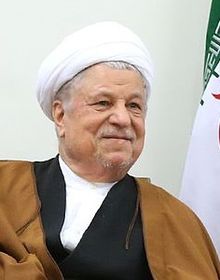Breaking
- MENU

Chairperson of the powerful Expediency Council and former president Ayatollah Ali Akbar Hashemi Rafsanjani passed away on Sunday, 8 January 2017 in Tehran. According to the Islamic Republic News Agency (IRNA) he was admitted to the Shohada Hospital in Tehran Sunday morning after suffering from an acute heart attack and passed away shortly thereafter. He was 82.
One of the most influential Iranian politicians and the leading figure of the moderate camp, Rafsanjani was considered to be a mentor of the current President Hassan Rouhani. Rafsanjani rose to prominence as a close aide of Ayatollah Khomeini and played a key role in the 1979 Islamic Revolution. He was elected to the Majlisal-Shura al-Islami (parliament) in 1980 and subsequently was elected its speaker, a post he held until he was elected the fourth president of the Islamic Republic in 1989.
As president, Rafsanjani is credited with reconstruction of the Iranian economy that had suffered due to the Iraq-Iran War (1980-88) and reached out to the neighbouring Arab states. After taking office, he famously remarked that “Iran needs to stop making enemies.” Rafsanjani saw the oil-rich Gulf Cooperation Council (GCC) states as a source of investments toward improving the dilapidated Iranian economy. During his presidency relations with Saudi Arabia improved and tensions between the two neighbours came down leading to improved trade. One of the key factors was Saddam’s invasion of Kuwait in August 1992 that resulted in Iraq being seen as a bigger threat to the GCC States than Iran.
The lessening of tensions and resumption of diplomatic ties followed agreement on the over Iranian pilgrims to Hajj. In December 1997, the Organization of Islamic Conference (OIC, now renamed as Organization of Islamic Cooperation) summit was held in Tehran which was attended by Saudi Crown Prince Abdullah and Foreign Minister Saud al-Faisal. The following year President Mohammed Khatami of Iran visited Riyadh leading to further improvement in the bilateral relations.
Rafsanjani was also credited with backing Ali Khamenei to position of supreme leader after the death of Ali Khomeini in 1989; however, their relations soured subsequently, especially during the presidency of Mahmoud Ahmadinejad (2005-2013) due to Khamenei’s backing of the conservative camp. Rafsanjani’s political fortunes and influence also declined during this period as moderates were marginalized. His efforts to be re-elected as president in 2013 could not materialize as he was disqualified by the Guardian Council. Rafsanjani then came out in support of Rouhani who eventually was elected president leading to bolstering of the moderate camp and emergence of Rafsanjani as its leading light.
Rafsanjani backed the Iran’s negotiations with the P5+1 on its nuclear programme and emerged as the most senior pro-agreement Iranian voice. His statement that the “world of tomorrow is one of negotiation, not the world of missiles” leading to a rare open criticism by Khamenei who without naming Rafsanjani said that those who make such claims are either “thoughtless” or “treacherous”.
The Indo-Iranian relations improved during the 1990s when Rafsanjani was at the helm of affairs. In fact, it was Rafsanjani who heralded the shift in Iranian position on Kashmir. Until the early 1990s, Iran had openly backed the separatists by supporting the right of self-determination of Kashmiris. However, with active Indian diplomatic effort and changing geopolitical climate, Iran shifted its position to neutrality vis-à-vis Indo-Pakistani problems. In September 1993, when Prime Minister Narasimha Rao visited Iran, President Rafsanjani assured him that Iran has no intention of interfering in internal matters of India and agreed that the dispute should be resolved through negotiations. In April 1995, he also became the first Iranian President to visit India after the 1979 Islamic revolution. The visit was remarkable for many reasons; he addressed a joint session of parliament, endorsed Indian commitment toward secularism and even refused to comment on the controversial demolition of Babri Mosque. The visit was seen by many as path-breaking and unprecedented.
Rafsanjani was politically active until the end and was reportedly taking keen interest in preparation for the presidential elections due in May this year. In early December, he reportedly created a political storm by accusing the leading figure in hard-line camp MesbahYazdi of being “the enemy of the Imam [Khomeini]” who have now “infiltrated” the centres of power in Iran. His manoeuvres against MesbahYazdi has earlier led to the latter’s defeat in the Assembly of Experts.
The demise of Rafsanjani is indeed a big loss to Iranian politics, especially the moderate camp, and might have far-reaching impacts on the direction of the country. With passing away of Rafsanjani and ailing Khamenei, it is certain that Iranian politics is at the verge of a generational change and as observed by renowned scholar Vali Nasr the demise of Rafsanjani “in some ways rattles Iran’s political system, in that it underscores the fact that with everything else going on … there will be a passing of the baton to the next generation.”
Dr. Md. Muddassir Quamar is a Associate Fellow at the Institute of Defence Studies and Analyses (IDSA). Email
As part of its editorial policy, the MEI@ND standardizes spelling and date formats to make the text uniformly accessible and stylistically consistent. The views expressed here are those of the author and do not necessarily reflect the views/positions of the MEI@ND. Editor, MEI@ND: P R Kumaraswamy
Kurdish leader and former President of Iraq (2005-2014), Jalal Talabani, breathed his last on 3 October 2017 in Germany. He was 83 and was under treat...
Read More »Born in Poland on 2 August 1923, Szymon Persk who later Hebraized his name as Shimon Peres was the leader of the pre-state Israeli leadership. After a...
Read More »Abdullah bin Abdul-Aziz al-Saud, the architect of unprecedented and much needed reforms in Saudi Arabia, breathed his last in Riyadh on Friday, 23 Jan...
Read More »The biggest funeral at the history of Israel takes place at 7 October. More than 800,000 people (about 10 per cent at Israel population) attended at t...
Read More »